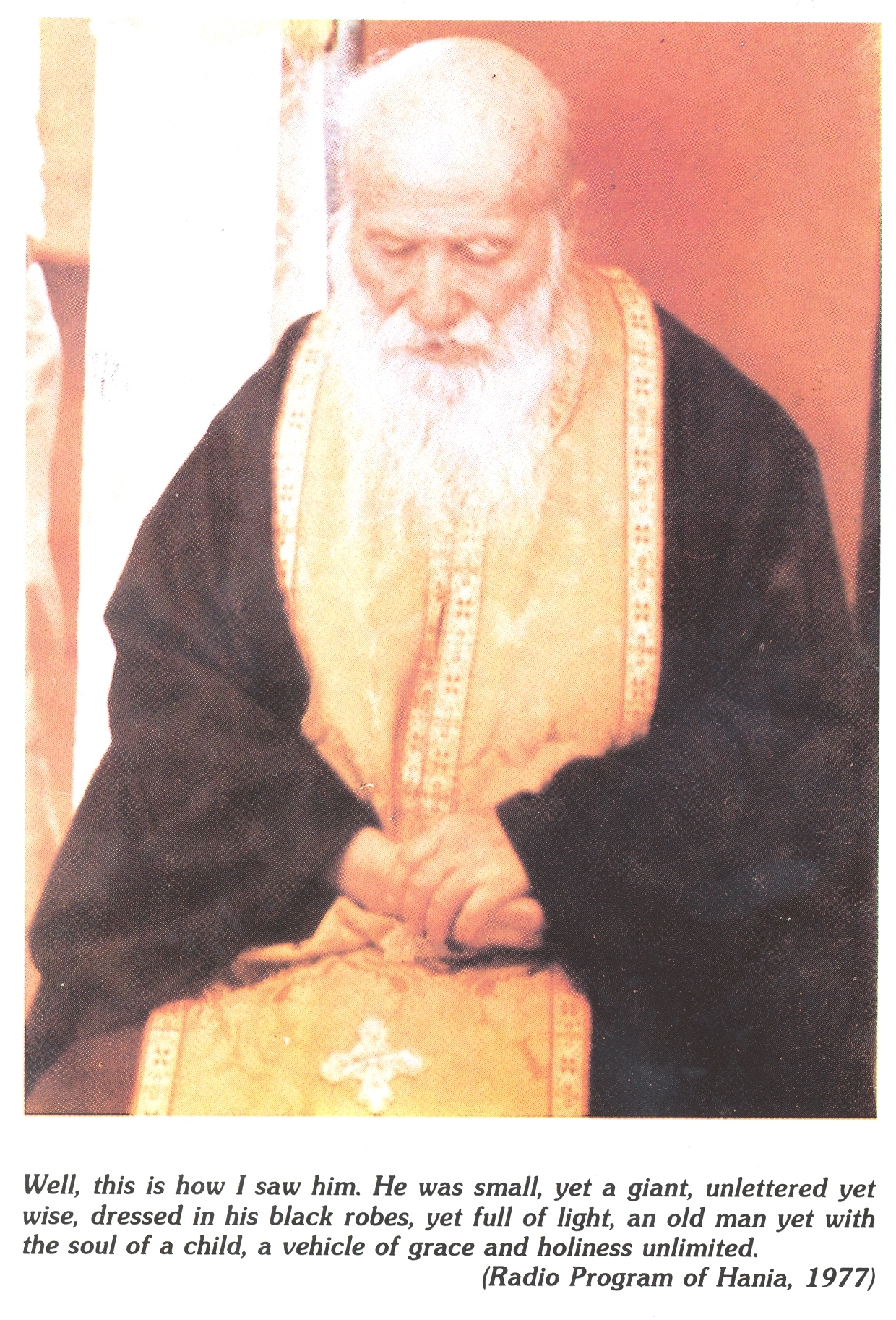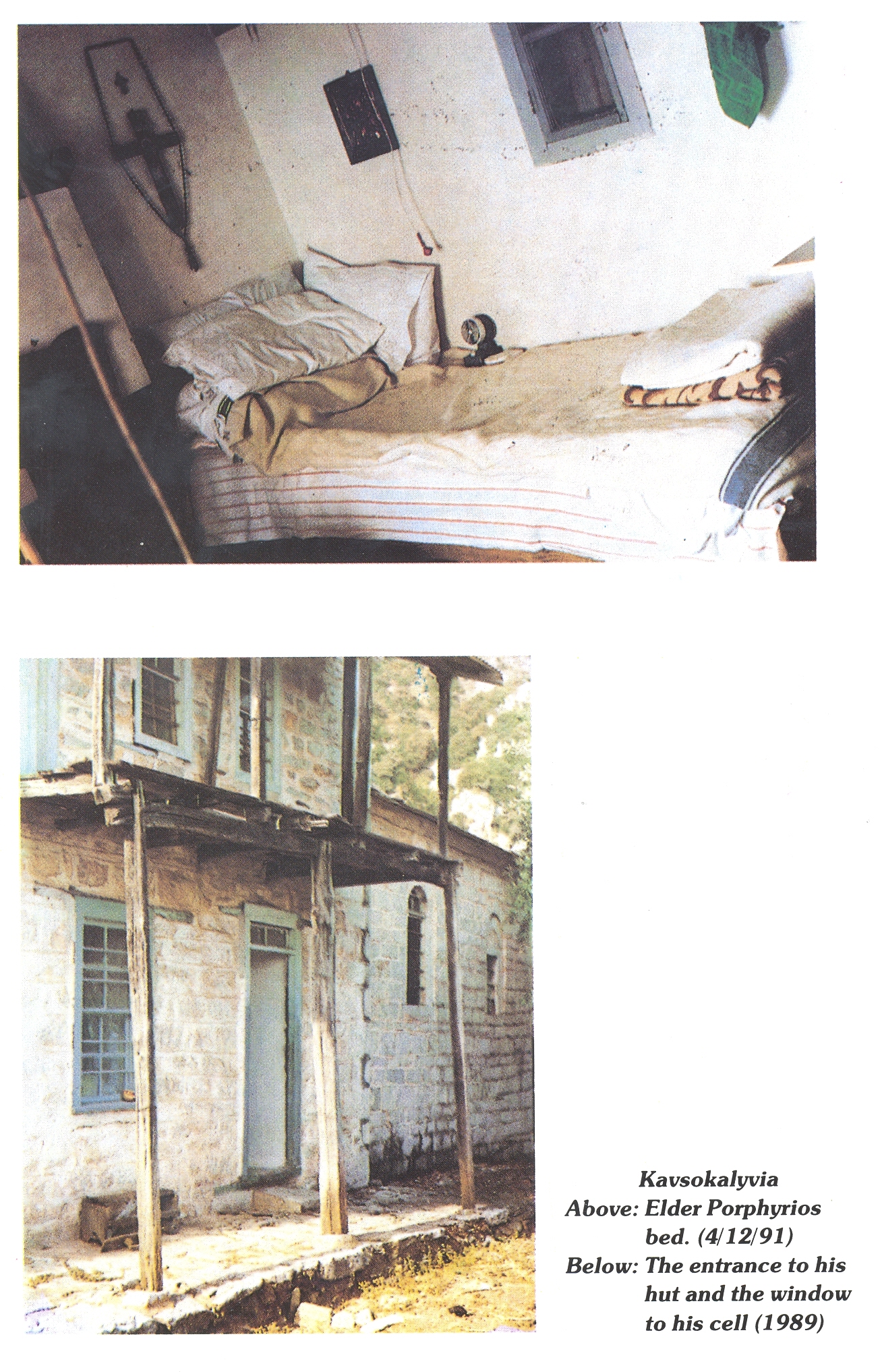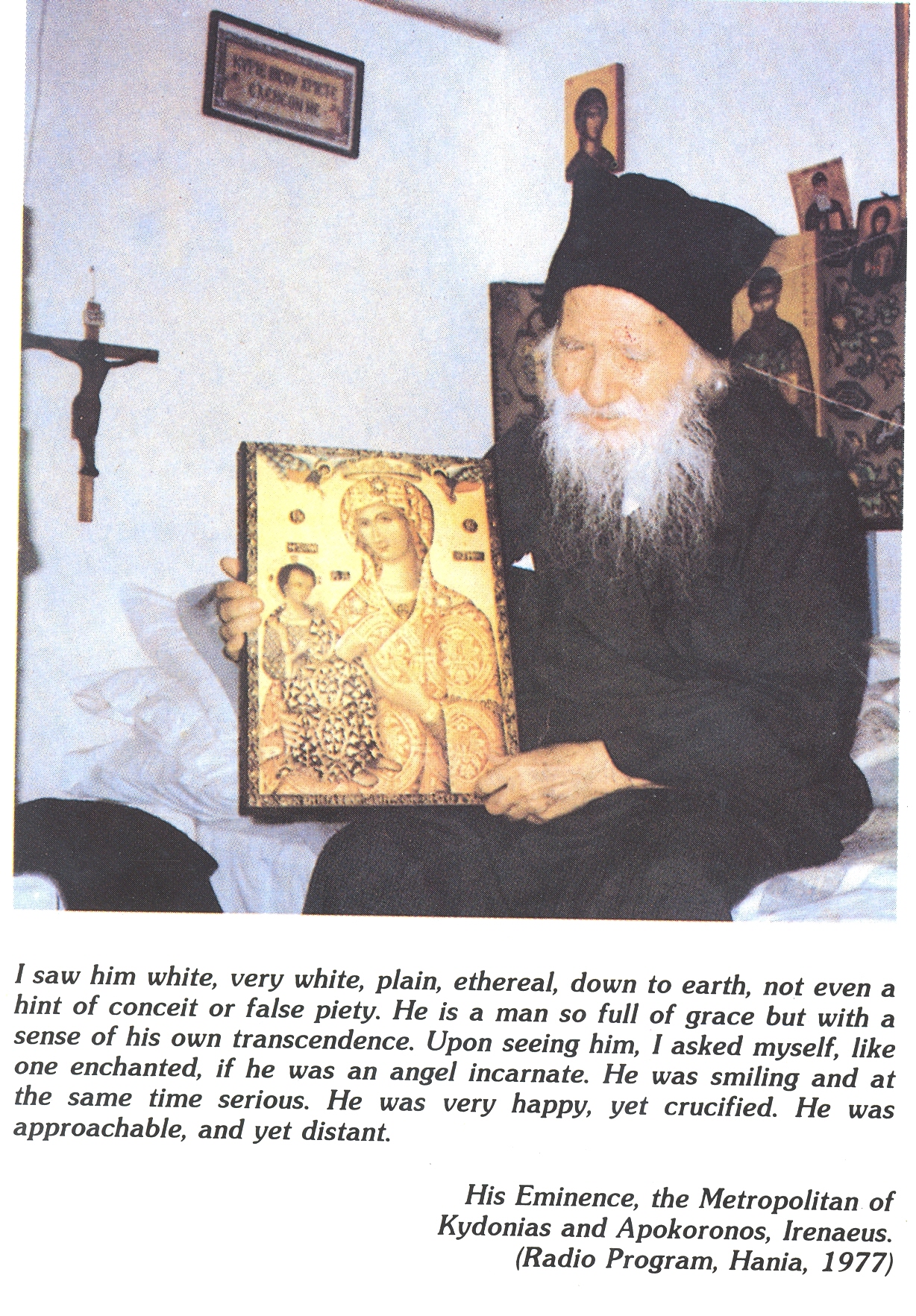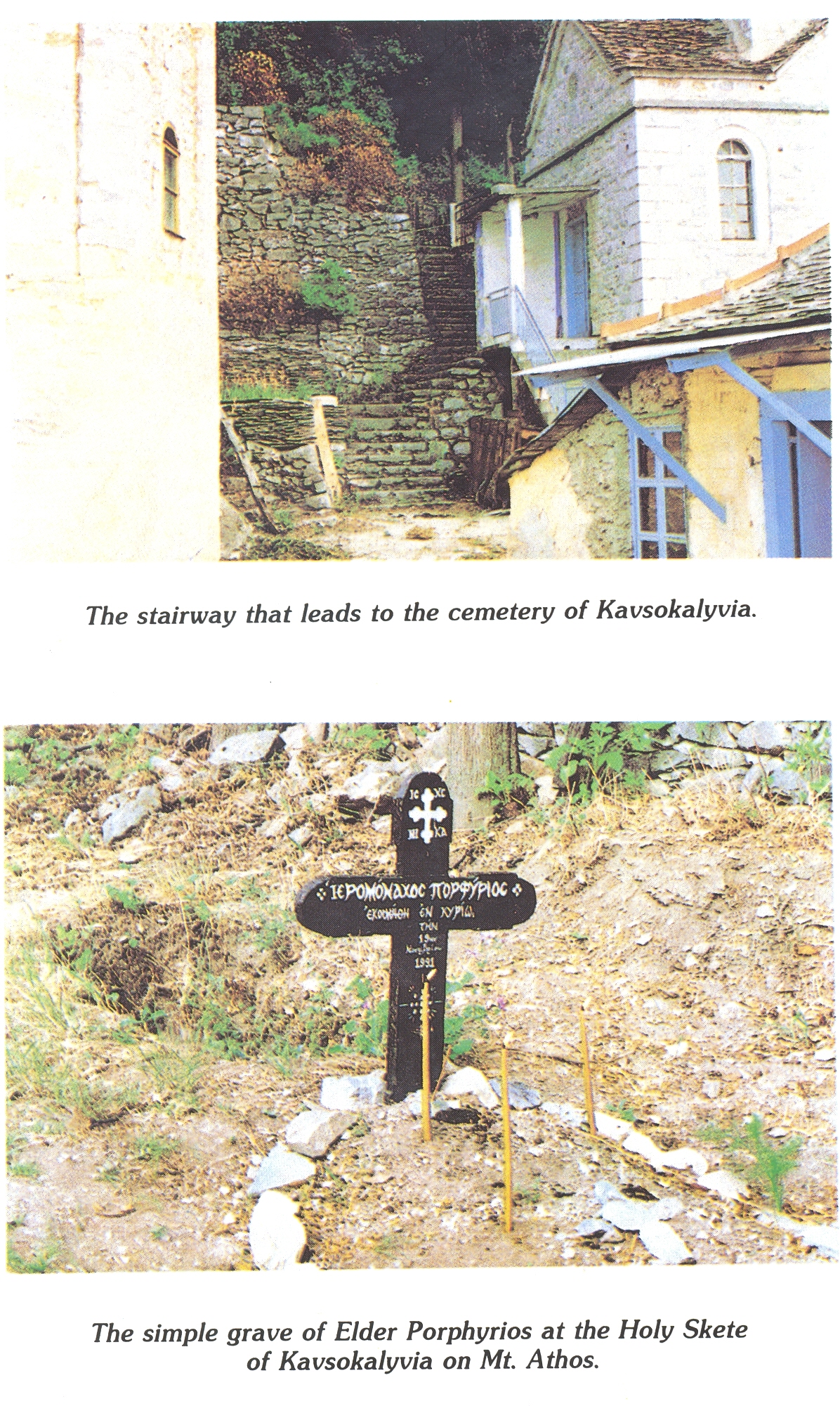 |
Orthodox Outlet for Dogmatic Enquiries | Digital Books |
|---|
Previous // Contents // Next
ELDER PORPHYRIOS
Testimonies and Experiences
They wrote about Elder Porphyrios
Constantine Gregoriades
Honorary General Inspector of Secondary Education Doctor of Theology, Writer
=============================================================
Mr. Gregoriades gave us the following text especially for this second edition. This is in place of his conversation found in the first edition.
"Wondrous is God in His Saints"
Elder Porphyrios' presence in our world during our lifetime was truly a blessing from God. Each of us lives in psychological confusion and our whole society is in moral and spiritual disorder. God, however, revealed His boundless love which nurtures all of us, each one of us, personally through the saintly figure of Elder Porphyrios.
The love of God is always substantial, say the Fathers of our Church. That is to say, it is offered through specific people and events. God's pre-eminent manifestation of His love was in the Person of Jesus Christ. "In this the love of God was manifested toward us, that God has sent His Only Begotten Son into the world that we might live through Him" (1 John 4:9).
It is a fundamental truth of our salvation that Elder Porphyrios reminded us of, less through teaching and more through his own sanctified self. The Elder received God's love with the indissoluble communion he had with Christ. "Christ," he said, "is everything, the Alpha and the Omega, the beginning and the end, our true life." His being was flooded with Christ's love for all of us. He embraced people with affection, respect, leniency, and with boundless goodness.
Each one of us (even out of simple curiosity) could feel the presence of Christ in Elder Porphyrios. You felt uplifted and brave even while carrying the unbearable weight of your sins. You experienced the warmth of a personal communion that was full of Christ's love.
Elder Porphyrios, compared with the other spiritual figures who have lived here, is distinguished by the fact that he was drawn by God's love at a very young age. This is exactly what he wrote in his last letter and testament to his spiritual children.
The element of love was very characteristic in Elder Porphyrios, and because of it, the people of God received his blessing. This is not only true in the areas where the Elder, lived in Athens, Kallisia, in Milesi and elsewhere - but throughout the whole land, even outside Greece. Many people from all parts of the world would call the Elder for hours on end, trying to solve the many problems that burdened them.
When one feels the presence of Christ in the person of Elder Porphyrios, then we have the manifestation of a saintly figure, a sanctified man in our midst. This explains why people flocked to the Elder in such numbers to receive his blessing and to be enlightened. He was unable to satisfy everyone, especially during the last years of his life, because of severe fatigue and the numerous illnesses.
The reflection of God's blessing.
Elder Porphyrios did not teach with words but particularly reflected the presence of Christ with his own example. He allowed himself to be open and transparent so that this love would reflect upon others. This is why we can say that he is the supreme man of God.
A man of God means a man of love, of giving, of serving and of sacrifice. Despite his sickness, (the reason why his elders on Mt. Athos sent him back to his parents) he worked very hard for thirty or more years at the St. Gerasimos' Chapel in the Polyclinic on Omonia Square, right in the heart of Athens.
He did not only give Christ's love to the sick of the Polyclinic but also to all those who hastened to visit him, to confess and to seek his enlightened advice on the many problems they faced.
Despite his illness, the Elder felt sorry for the people that he received so that he could attend to their problems. He ignored his own suffering to help those who were in pain. When his body could bear no more, people simply walked by his cell and received his blessing, which was enough to sustain people and to alleviate their pain.
Elder Porphyrios' Gifts
The Elder had received from an early age many gifts from God. He had the great gift of feeling human sinfulness deeply. The Fathers of the Church help us to understand that it is not an easy thing to accept one's sinfulness. A person feels that he is a sinner when he comes to know all that God has revealed to him within the communion of His love.
Elder Porphyrios was impressed by all the wonderful things God had revealed to him. This high level of spirituality was expressed in his feeling of his own insignificance. In a very emotional way he emphasized this reality in his letter to his spiritual children, "I, however, feel that I am the most sinful person in the world...I have the feeling that my spiritual sins are many and I ask all those who have known me to pray for me, because for as long as I lived, I humbly prayed for you too."
Besides, this is an indication of holiness: to feel sinful, to bear the sorrowful state of the world's sins, whilst lifting people up to such a level that they live your reflection of holiness, having then the feeling of a true saint's presence amongst them.
Elder Porphyrios had many gifts. He had the gift of leniency, the gift of vigil. He did not sleep at night because he used the time to pray for all the people and especially for those who suffered from serious illnesses.
He always said, "I will pray, but that's not enough. My prayer must find a reaction from you. God, who wants to send His Grace to us, must find us with our arms open, ready to embrace it. Regardless of whether He heals us or whether He allows our suffering to continue, His action will be for our spiritual benefit."
"When I am weak, then I am strong." (2 Cor. 12:10)
Elder Porphyrios considered sicknesses to be a very great blessing from God. We all know that he had a weak physical nature. God allowed the Elder to be tried by many diseases. More than anything else he suffered from terrible headaches that created an unbearable condition. They made him feel so faint that he could not continue his conversation with the people. However he would often proceed, with God's grace, to guide those urgent situations. He would set himself aside and concern himself with the progress and salvation of others.
Elder Porphyrios saw God's presence in people through pain and sickness. When a person suffers, he feels his weakness intensely. He can't rely on himself because he sees that his strength is waning. He wants to be able to get through these difficulties. This is why he is dependent on God's love, His love for humankind. When a person communicates with God unceasingly in prayer, and when he entrusts himself to Him, the real strength that comes from God and leads to salvation, is conveyed to him. That is to say, it leads to union with God and participation in the life of the Holy Triune Deity! .
When we asked the Elder about his health, he would tell us a few things. His personal struggle gave him the opportunity to offer us this great truth, "God more than loves us and He wants us to become His by totally surrendering ourselves."
"Let us commit our whole lives to Christ our God."
This is made much easier when sickness does not allow us to depend upon our own strength. Sickness then becomes a real benefit to us. This is why the Elder said, "Don't pray to God to make you well. He knows what is good for you and will act with the infinite love that He has for mankind."
Elder Porphyrios' gift of foresight.
The crown of all the gifts that God had given him was his gift of foresight. The presence of the Holy Spirit within him not only made his own being transparent, but also that of others. With the action and enlightenment of the Holy Spirit, Elder Porphyrios saw the secrets of the human soul. Whenever it was necessary to tell us something that was helpful for our salvation in Christ, he said it. In fact, he would say it in such a way that not only would you not become frightened but on the contrary, you would receive courage and boldness in order to continue your spiritual journey.
Many people had a hard time understanding what this gift of the Elder was all about. This is why he would complain, "Most people don't realize that this gift is not my own ability. I say a few things that God enlightens me to say, so that the world will feel Christ's embrace for all of us. And so it will give its own love to Christ in response."
He himself said that many people thought that grace was clairvoyant or magic ability. This upset him. If someone approached the Elder with more faith in such clairvoyance then he would not reveal his gift of foresight. In other words, the Elder would not answer those things that the visitor would ask him. On the other hand, when he saw that the person who approached him had the disposition to repent, then he would talk to him about specific things that concerned him.
Let us mention, for example, issues of health, so that we will not touch upon other personal spiritual issues. He would tell certain people who had problems with their health to go to the doctor. In fact, he established and described in detail the particular problem and the spot where the complaint was located. Doctors were astounded by his medical knowledge. Many doctors went to the Elder to get his blessing. He would tell them things of a medical nature which helped in fulfilling their duties.
The Elder would say to others, "You have this problem, but it's better that you don't undergo surgery. We will overcome it in another way." He would also point out, along with the correct diet, the spiritual direction they must take. A person could write a whole book about Elder Porphyrios' gift of foresight. Perhaps those concerned could take it in hand: it would be helpful for all of us. In any event, as we have noted, the Elder used his gift of foresight for people's spiritual edification. His purpose was, as he often said, to help people find themselves in loving communion with Christ and to be able to receive their salvation.
The road to sanctification
The Elder frequently said: "Every sinful person is all mixed up inside. We must open a small crack in our soul so that Christ's light and love can enter. That's how we begin to straighten out our soul. Christ always takes the initiative. We must be open to Him and afterwards, through our own vigilant effort (with prayer, confession, Holy Communion and love) we may feel the magnificence that God reveals to us. He has destined all of us for Paradise."
"And what is Paradise? Christ is," said the Elder. "When you love Christ, despite all your feeling of sinfulness and your weaknesses, you have the certainty that you have gone beyond death because you dwell in the communion of Christ's love. May God make us worthy to see the Face of the Lord, both from here on earth and from there, where we are going."
This sanctification was addressed by the Elder in a very ecclesial and Orthodox manner. One's spiritual struggle is always realized within the life of the Church, never individually. "You can't repent correctly and find God's love walking in a vertical line. That is, it is not only you and God, you and Christ. Christ's love is shared and always flows through other people."
The Elder guided people to the Sacraments of our Church. "Christ reveals himself only within the Church. There where people unite and love one another, regardless of their sins. Not through their own abilities, but through Christ's mercy and love. Christ's love holds all of us together. He makes us one body and we participate in the theanthropic life of the Lord. In this way, the only way, we rise above the distraction and destruction of sin. This is truth's highest point, the Holy Eucharist."
The Elder always advised people to receive Holy Communion frequently according to their spiritual development. The corresponding preparation (confession, repentance, fasting and humbleness) is a must. He helped us understand that the greater our spiritual preparation was, the more sinful we feel. A person should never trust their own powers, but in Christ's mercy and compassion. The Elder instilled this road to sanctification in people's souls..
The meeting at Kavsokalyvia
About two months before the Elder passed away, I found myself by godly coincidence in the wilderness of Kavsokalyvia, Mt. Athos (in the middle of October 1991). I did not know that the Elder was there. At the main Church of Kavsokalyvia, I learned about the presence of the Elder in the hut of St. George. They told me that he was very sick and we would not be able to see him.
However, when the Elder discerned our conversation with the monks, he gave a blessing, and I went up to his hut. We had an amazing spiritual conversation for about three hours. We were both greatly moved. I asked the Elder why this was so, and he answered us as follows, "It is due to two things. I never dreamed that we could meet here at Kavsokalyvia. Meeting vou here has made me very happy, that's why I'm so emotional. Besides this room (it was a very small room) is the place where I started. I was fourteen years old and I came up here to the elders of blessed memory, Panteleimon and Ioannikios. God has allowed me to come back here." His eyes, that were shut, filled with tears of joy, gratitude and thanksgiving to God, as he said those words.
The Elder had his own reasons for returning to his hut. I did not suspect a thing about his preparation to leave. In fact, when I asked him if he was going to stay up there because the people in Athens were waiting for him, he smiled with kindness and love and said to us, "Change the subject because what you're asking depends neither on me nor you." The Elder's face was lit up in such a way that you could not get enough of that feeling of Christ's presence in our midst.
The Elder's death and the revelation of his love.
When I bid farewell to the Elder, his last words were, "Go with the Christ's blessing. Your presence has gladdened my soul more than you can imagine." The fullness of love in
Christ is found exactly here. The Elder had the "mind(nous) of Christ" and always reflected the love of the Lord. He saw the image of Christ in people's faces.
He showed his love towards us right up until his last moment. His desire that people be informed about his death only after his burial on Mt. Athos reveals not only his profound humbleness but also his respect and love for people.
If the monks and the rest of the world had learnt about the Elder's death, hundreds, if not thousands, would have flocked there. It is very difficult for such a crowd to find room at Kavsokalyvia, which is found at the tip of the Athonite peninsular. To get there you must use the caique from Daphni. It is small and holds only forty or fifty people. There would have been a lot of overcrowding with dangerous unforeseen incidents. Besides, it was a harsh winter, and the weather was bad. Nobody could stay there overnight.
Elder Porphyrios was inspired by God and he passed away at daybreak on the second of December 1991 (new calendar). An all-night vigil began, that same day, in the afternoon and his honorable remains were buried at dawn the next day. Only then was his death learned of.
The Elder had boundless love for all of us while here on earth. Now that he can be found in heaven, we are sure that he constantly calls upon God, and in all boldness prays for all of us, for the whole world, and for each one of us personally. It is a great blessing to have one of your 'own' saints in heaven.
The Elder prays for Christ's love to be stimulated within our hearts, and for God to make us worthy to leave this world and to enter His terrestrial uncreated Church. Elder Porphyrios left us this paradise of Christ's love. It is the greatest inheritance that he could have left us before leaving for heaven.
To Porphyrios
Porphyrios, the new, the discerning, fell
asleep on the Holy Mountain, in his cell
at Kavsokalyvia where he struggled.
He blessed us with love, in his will
"Read the lives of the Saints, and fill
your souls with love for God.
May your life be liturgical, holy, young,
with the Psalter, the Gospel, the Menaion."
Your soul is an angel
amongst the hosts in the air
Your blessing gives us hope
that we'll live with you there.
We thank you our Elder,
Your prayer gives us heavenly power.
Evangelos Karademos
(Reprinted from the periodical Lydia (December, 1991, page 362) with the permission of the author)




.
____________
Previous // Contents // NextArticle published in English on: 19-3-2009.
Last Update: 3-4-2009.